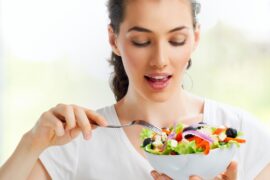In the pursuit of building lean muscle, the food we consume is just as crucial as the time we spend in the gym. The right combination of nutrients can significantly enhance our strength, support recovery, and promote muscle growth. As a seasoned muscle food blogger, I’m excited to guide you through 30 powerhouse foods that can help you achieve your fitness goals. This isn’t just about eating more; it’s about eating smart.

Nutrition is the bedrock of a successful training regimen, and as the saying goes, “You can’t out-train a bad diet.” Whether you’re an experienced athlete or a newcomer to the fitness world, understanding the role of lean muscle foods in your diet can help you sculpt the body you desire.
Let’s dive into the essential foods that will not only bolster your strength but also support overall health.
The Science of Muscle Growth
Before we explore our list, it’s essential to understand why certain foods are categorized as “lean muscle foods.” Building muscle requires a combination of macronutrients: proteins, carbohydrates, and fats. According to a study published in the Journal of the International Society of Sports Nutrition, “Protein intake is critical for muscle hypertrophy,” as it provides the necessary amino acids for muscle repair and growth (JISSN, 2017).
Key Nutritional Elements:
– Protein: Essential for muscle repair and growth.
– Healthy Fats: Important for hormone production, including testosterone, which plays a vital role in muscle development.
– Complex Carbohydrates: Provide energy for workouts and recovery.
With this foundational knowledge in mind, let’s explore the 30 lean muscle foods that will help you on your journey to strength and size.
1. Chicken Breast: The Lean Protein Powerhouse
Chicken breast is a staple in many fitness enthusiasts’ diets for a reason. With about 31 grams of protein per 100 grams and minimal fat, it’s the ultimate lean protein source. As nutritionist Dr. John Berardi states, “Chicken is not just protein; it’s a complete protein that aids muscle recovery.”
Nutritional Profile:
– Calories: 165
– Protein: 31g
– Fat: 3.6g
2. Salmon: Fatty Fish for Healthy Gains
Salmon is packed with omega-3 fatty acids, which have been shown to reduce inflammation and enhance muscle recovery. It offers around 25 grams of protein per 100 grams, making it an excellent choice for muscle building.
Nutritional Profile:
– Calories: 206
– Protein: 25g
– Fat: 13g
3. Quinoa: The Complete Grain
Often dubbed a superfood, quinoa is one of the few plant-based sources that provides all nine essential amino acids. With 8 grams of protein per cup, it’s a fantastic option for those looking to increase their protein intake without consuming animal products.
Nutritional Profile:
– Calories: 222
– Protein: 8g
– Fat: 3.6g
4. Greek Yogurt: Creamy and Protein-Packed
Greek yogurt is not just a tasty snack; it’s also rich in protein, calcium, and probiotics. With about 10 grams of protein per 100 grams, it’s ideal for a post-workout recovery snack.
Nutritional Profile:
– Calories: 100
– Protein: 10g
– Fat: 4g
5. Eggs: Nature’s Perfect Protein
Eggs are a complete source of protein and contain essential nutrients like choline, which supports muscle function. With about 6 grams of protein per egg, they are versatile and easy to incorporate into your diet.
Nutritional Profile:
– Calories: 155
– Protein: 6g
– Fat: 11g
6. Cottage Cheese: The Nighttime Snack
Cottage cheese is a fantastic source of casein protein, which digests slowly and can help with muscle recovery overnight. One cup provides about 28 grams of protein, making it an excellent addition to your nighttime routine.
Nutritional Profile:
– Calories: 206
– Protein: 28g
– Fat: 10g
7. Lean Beef: Nutrient-Dense Muscle Builder
Lean cuts of beef are rich in iron and zinc, both of which are vital for muscle repair and growth. With approximately 26 grams of protein per 100 grams, lean beef is a solid choice for those looking to bulk up.
Nutritional Profile:
– Calories: 250
– Protein: 26g
– Fat: 15g
8. Tofu: The Plant-Based Powerhouse
Tofu is an excellent source of plant-based protein, providing about 8 grams per 100 grams. It’s also a great option for vegetarians and vegans looking to add more protein to their diets.
Nutritional Profile:
– Calories: 76
– Protein: 8g
– Fat: 4.8g
9. Lentils: Fiber-Rich Protein Source
Lentils are not only high in protein (around 9 grams per half-cup cooked) but also provide fiber, which aids in digestion. They are versatile and can be used in soups, salads, and more.
Nutritional Profile:
– Calories: 115
– Protein: 9g
– Fat: 0.4g
10. Chickpeas: The Versatile Legume
Chickpeas are another excellent source of plant-based protein, offering about 15 grams per cup. They are high in fiber and can be used in a variety of dishes, from salads to hummus.
Nutritional Profile:
– Calories: 269
– Protein: 15g
– Fat: 4.2g
11. Brown Rice: A Complex Carb Favorite
Brown rice is a complex carbohydrate that provides sustained energy, making it a perfect side dish for your protein-rich meals. With about 5 grams of protein per cup, it’s a great addition to any meal.
Nutritional Profile:
– Calories: 218
– Protein: 5g
– Fat: 1.6g
12. Sweet Potatoes: Nutrient-Dense Carbs
Sweet potatoes are a fantastic source of complex carbohydrates, fiber, and vitamins A and C. With about 4 grams of protein per medium-sized potato, they complement a muscle-building diet beautifully.
Nutritional Profile:
– Calories: 112
– Protein: 4g
– Fat: 0.1g
13. Nuts and Seeds: Healthy Fats for Muscle Growth
Nuts and seeds, like almonds and chia seeds, are packed with healthy fats and protein. For example, almonds contain about 21 grams of protein per 100 grams and are high in vitamin E, which is crucial for muscle recovery.
Nutritional Profile (Almonds):
– Calories: 576
– Protein: 21g
– Fat: 50g
14. Whey Protein: The Ultimate Supplement
Whey protein is a fast-digesting protein ideal for post-workout recovery. Research shows that “whey protein supplementation can significantly enhance muscle growth when combined with resistance training” (Phillips et al., 2016).
Nutritional Profile:
– Calories: Varies (approximately 120 per serving)
– Protein: 24g
– Fat: 1g
15. Peanut Butter: A Delicious Source of Energy
Peanut butter is not only delicious but also packed with protein and healthy fats. With about 25 grams of protein per 100 grams, it’s perfect for smoothies or on whole-grain bread.
Nutritional Profile:
– Calories: 588
– Protein: 25g
– Fat: 50g
16. Bison: Leaner Alternative to Beef
Bison is leaner than traditional beef and contains about 28 grams of protein per 100 grams. It’s also rich in iron and vitamin B12, making it an excellent option for muscle growth.
Nutritional Profile:
– Calories: 143
– Protein: 28g
– Fat: 2.4g
17. Edamame: Young Soybeans for Protein
Edamame is a complete protein source and provides about 11 grams of protein per 100 grams. These young soybeans are also rich in antioxidants and fiber, making them a nutritious snack.
Nutritional Profile:
– Calories: 121
– Protein: 11g
– Fat: 5g
18. Sardines: Omega-3 Powerhouses
Sardines are not only rich in protein (about 25 grams per 100 grams) but also packed with omega-3 fatty acids. They can be eaten straight from the can or added to salads for an extra nutrient boost.
Nutritional Profile:
– Calories: 208
– Protein: 25g
– Fat: 11.5g
19. Spinach: The Nutrient-Dense Leafy Green
Spinach is often overlooked but is a nutrient powerhouse. It contains about 3 grams of protein per cup and is rich in vitamins and minerals that support overall health and muscle recovery.
Nutritional Profile:
– Calories: 23
– Protein: 3g
– Fat: 0.4g
20. Broccoli: The Fiber-Rich Green
Broccoli is high in fiber and provides about 3 grams of protein per cup. It’s also rich in vitamin C, which helps with recovery post-workout.
Nutritional Profile:
– Calories: 55
– Protein: 3g
– Fat: 0.6g
21. Bell Peppers: Colorful and Nutritious
Bell peppers are not only vibrant but also rich in antioxidants and vitamin C. They contain about 1 gram of protein per cup and can add flavor and nutrition to your meals.
Nutritional Profile:
– Calories: 31
– Protein: 1g
– Fat: 0.3g
22. Cauliflower: Low-Carb Versatility
Cauliflower is a low-carb alternative to grains and legumes, providing about 2 grams of protein per cup. It’s versatile and can be used to make rice, pizza crust, and more.
Nutritional Profile:
– Calories: 25
– Protein: 2g
– Fat: 0.3g
23. Mushrooms: Umami and Nutrients
Mushrooms are low in calories and offer about 3 grams of protein per cup. They are also a great source of B vitamins, which help support energy metabolism.
Nutritional Profile:
– Calories: 22
– Protein: 3g
– Fat: 0.3g
24. Coconut Oil: The Healthy Fat Source
Coconut oil is rich in medium-chain triglycerides (MCTs), which can provide a quick source of energy. While it’s not a significant protein source, incorporating healthy fats is essential for hormone production.
Nutritional Profile:
– Calories: 892
– Protein: 0g
– Fat: 100g
25. Apples: The Fiber-Rich Snack
While apples may not be protein-rich, they are an excellent source of fiber and can be a great post-workout snack when paired with protein-rich foods like nut butter.
Nutritional Profile:
– Calories: 95
– Protein: 0.5g
– Fat: 0.3g
26. Blueberries: Antioxidant-Rich Fruit
Blueberries are high in antioxidants, which can help reduce muscle soreness post-workout. They contain about 1 gram of protein per cup and are delicious in smoothies or oatmeal.
Nutritional Profile:
– Calories: 84
– Protein: 1g
– Fat: 0.5g
27. Oats: The Breakfast Champion
Oats are a complex carbohydrate source that provides lasting energy. They contain about 6 grams of protein per cup and can be an excellent base for protein-packed breakfasts.
Nutritional Profile:
– Calories: 154
– Protein: 6g
– Fat: 3g
28. Barley: The Whole Grain Alternative
Barley is a nutrient-dense grain providing about 3.5 grams of protein per cup. It’s also high in fiber, making it a great choice for digestion and overall health.
Nutritional Profile:
– Calories: 193
– Protein: 3.5g
– Fat: 0.6g
29. Tempeh: Fermented Soy Protein
Tempeh is a fermented soy product that’s high in protein, offering about 19 grams per 100 grams. It’s also a great source of probiotics, which support gut health.
Nutritional Profile:
– Calories: 193
– Protein: 19g
– Fat: 11g
30. Dark Chocolate: A Treat with Benefits
Yes, dark chocolate can be part of a muscle-building diet! With antioxidants and a moderate amount of protein, a small piece can satisfy your sweet tooth while providing health benefits.
Nutritional Profile:
– Calories: 546
– Protein: 5g
– Fat: 31g
Conclusion: The Power of Lean Muscle Foods
Incorporating these 30 lean muscle foods into your diet can pave the way for strength and size gains. Remember, muscle food isn’t just about protein; it’s about balanced nutrition that includes healthy fats and complex carbohydrates.
As you craft your meal plans, focus on variety and ensure you’re meeting your nutritional needs. The journey to building lean muscle is a marathon, not a sprint, and the foods you choose will significantly impact your results.
So, as you embark on or continue your fitness journey, let these musclefood options guide you toward your goals. Embrace the process, fuel your body wisely, and watch as your hard work pays off.
Take Action: Start by incorporating one new lean muscle food into your meals this week. Share your progress and favorite recipes, and let’s create a community dedicated to building strength and health together!






1 Comment
Pingback: Transform Your Body Muscle Gain Food Without Fat -